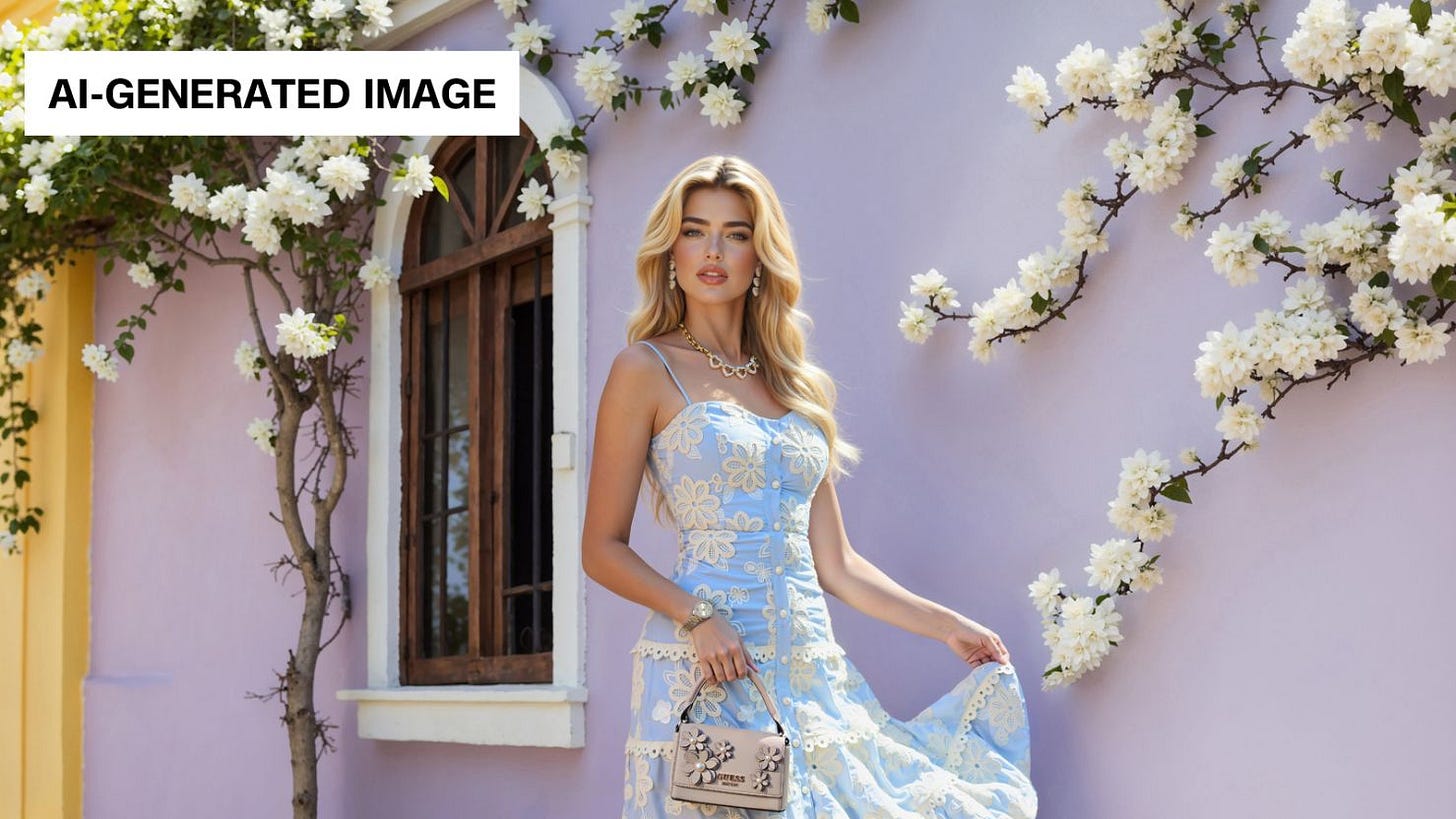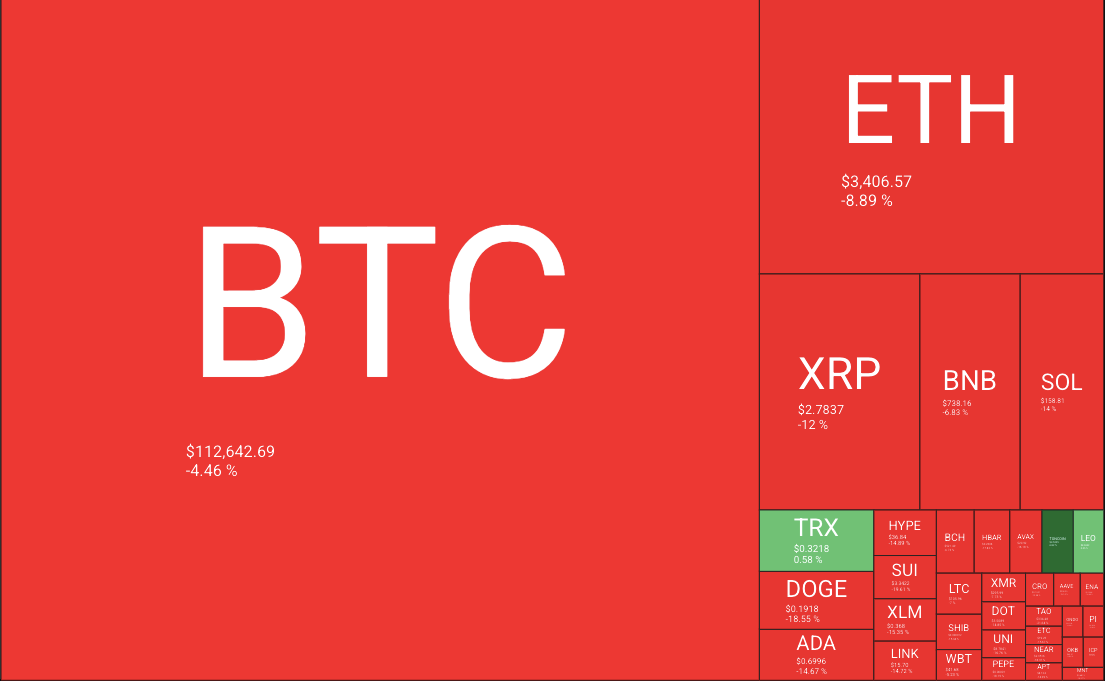Weekly Journal: Vogue Features Guess Ad with AI Model
[6 min read] Your weekend guide to getting ahead on the digital frontier. Fashion brands like Guess, Mango, H&M, and Levi’s are increasingly turning to AI models for speed, efficiency, and cost saving
Welcome to this week’s Weekly Journal 📔, your guide to the latest news & innovation in emerging technology, digital assets, and our exciting path to the Metaverse. This is week 139 of the 520 weeks of newsletters I have committed to, a decade of documenting our physical and digital lives converge. New subscribers are encouraged to check out the history & purpose of this newsletter as well as the archive.
- Ryan
🌐 Digital Assets Market Update
To me, the Metaverse is the convergence of physical & virtual lives. As we work, play and socialise in virtual worlds, we need virtual currencies & assets. These have now reached mainstream finance as a defined asset class:
🔥🗺️Heat map shows the 7 day change in price (red down, green up) and block size is market cap. Healthy pullback this week after a couple weeks of all time highs.
🎭 Crypto Fear and Greed Index is an insight into the underlying psychological forces that drives the market’s volatility. Sentiment reveals itself across various channels—from social media activity to Google search trends—and when analysed alongside market data, these signals provide meaningful insight into the prevailing investment climate. The Fear & Greed Index aggregates these inputs, assigning weighted value to each, and distils them into a single, unified score.
🗞️ Metaverse news from this week:
Welcome to the era of the AI supermodel.
Vogue’s August issue features ads by Guess—but the glowing blonde in the floral playsuit? She’s not human. She’s Vivienne, an AI-generated model created by London-based agency Seraphinne Vallora. And she’s ignited a social media firestorm. Fashion brands like Guess, Mango, H&M, and Levi’s are increasingly turning to AI models for speed, efficiency, and cost savings. These digital figures, created through a blend of AI design and real-world photography, now appear in global ad campaigns—even on Vogue’s glossy pages.
Supporters say AI opens up new creative possibilities and lets brands test more diverse looks. Critics say it risks erasing real people—especially models from underrepresented groups—while fuelling unrealistic beauty standards. Some even argue it’s a shortcut to “fake” diversity without truly hiring diverse talent. So, what happens when the avatars look better than the humans—and work cheaper too?
What It Takes to Put VR on Rollercoasters
In this interview, Marcus Ernst, project manager at Mack One shares how he and his team brought XR to life in Europa Park, the second largest theme park in Europe. From the challenges of strapping VR to a roller coaster to building scalable free-roaming experiences, Marcus dives deep into what it takes to balance storytelling, technology, and operational efficiency at scale.
👓 Read of the Week: Enter Money2: The Financial Operating System of the Metaverse
While the world chases the next AI model or memecoin frenzy, a quieter revolution is underway: the rise of Money2 — a trustless, code-based financial system powered by stablecoins and DeFi. In this provocative piece, Curve Finance founder Michael Egorov argues that Money2 isn’t some far-off dream; it’s already here, quietly moving $225B in stablecoin value and laying the rails for metaverse-native economies. From smart contracts replacing banks to tokenised real-world assets becoming the norm, this is a compelling call to look beneath the hype and see the protocol-shaped future of finance unfolding on-chain.
🎥 Watch of the week: My Keynote
As the metaverse evolves into a persistent digital layer overlaying the physical world, the tokenisation of real estate bridges these realms by enabling real-world property to have programmable, tradable digital counterparts. Tokenised real estate can be embedded into metaverse economies, unlocking fractional ownership, dynamic leasing models, and even utility-linked perks in virtual environments. From owning a slice of a luxury resort that grants digital access in a virtual twin, to investing in community-driven developments with blockchain-based governance, real estate tokenisation redefines how we own, experience, and interact with property—both online and off.
In true self indulgent form, here is a recording of a recent keynote I did on this topic, hope you enjoy.
AI Showcase🎨🤖🎵✍🏼: Why Agentic AI Needs a New Kind of Trust
In the Metaverse, AI will be critical for creating intelligent virtual environments and avatars that can understand and respond to users with human-like cognition and natural interactions.
As AI shifts from passive chatbot to active decision-maker, we’re entering the age of agentic AI—where digital agents act independently, make purchases, scrape websites, and even mimic human behaviour online. But this evolution brings a big problem: the internet’s security systems were built for human users, not autonomous AI agents.
According to HUMAN Security CEO Stu Solomon, bots and agents now outnumber humans online—and existing defences like bot filters and login checks aren’t enough. Enter adaptive trust: a new model that doesn’t just scan for bad actors at one point, but continuously analyses context, behaviour, and intent across the entire user journey. It’s already being deployed through HUMAN’s new “AgenticTrust” system, offering a smarter way to manage the blurred lines between real users, bots, and agentic AI. In a world where digital agents roam freely, trust can’t be static—it has to be adaptive.
Read more here: Why Agentic AI Needs An Adaptive Trust Layer
That’s all for this week! If you have any organisations in mind that could benefit from keynotes about emerging technology, be sure to reach out. Public speaking is one of many services I offer.




